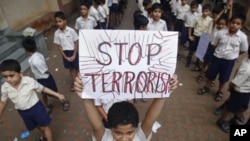Prime Minister Manmohan Singh sought to reassure chief ministers of India's states Monday he is on their side in securing the country's internal security.
Hosting a high-level meeting in the capital, Singh tried to allay regional concerns that a new anti-terror initiative represents a power grab by the central government.
"Threats from terrorism, left-wing extremism, religious fundamentalism and ethnic violence persist in our country," he said, calling threats from Maoist rebels one of the country's most serious ongoing security challenges. "These challenges demand constant vigilance on our part. They need to be tackled firmly, but with sensitivity. It is an endeavor that requires the united effort of us all, both at the center and in the states."
Singh said the so-called Maoist insurgency now affects nine states. Rebels have said they are fighting what they call severe inequalities in land acquisition and natural wealth distribution.
Federal-State Balance Questioned
The annual conference of chief ministers comes at a time when parliament faces heavy criticism from state governments and even political allies. West Bengal Chief Minister Mamata Banerjee, a coalition partner of Singh's who has expressed concern over a proposed National Counterterrorism Center, saying it will disturb the federal-state balance of authority, is staying away from the meeting.
But Singh called the central government an ally, not an opponent, of states on internal security issues.
"State governments are the primary responders in most internal security situations," he said. "I would urge the states and the Ministry of Home Affairs to carry forward police reform and modernization to their logical conclusion."
Indian Home Minister P. Chidambaram, perhaps the most outspoken advocate of the National Counterterrorism Center, warns that insurgents are becoming better armed and more sophisticated, and must be combatted on a national scale.
“The target is the Indian state and, naturally, every constituent of the Indian state," said Chidambaram. "In its offensive, the adversary does not recognize state borders; at the operational level, there is no conflict between central agencies and state police forces."
Narendra Modi, chief minister of India's Gujarat state and widely seen as a possible future prime minister, accused the government of acting "unilaterally" and not consulting states sufficiently on security issues.
The central government is scheduled to hold a separate meeting with chief ministers on the proposed counter-terror center early next month.
News
India PM: Center, States Must Unite Against Terror
- By Kurt Achin









